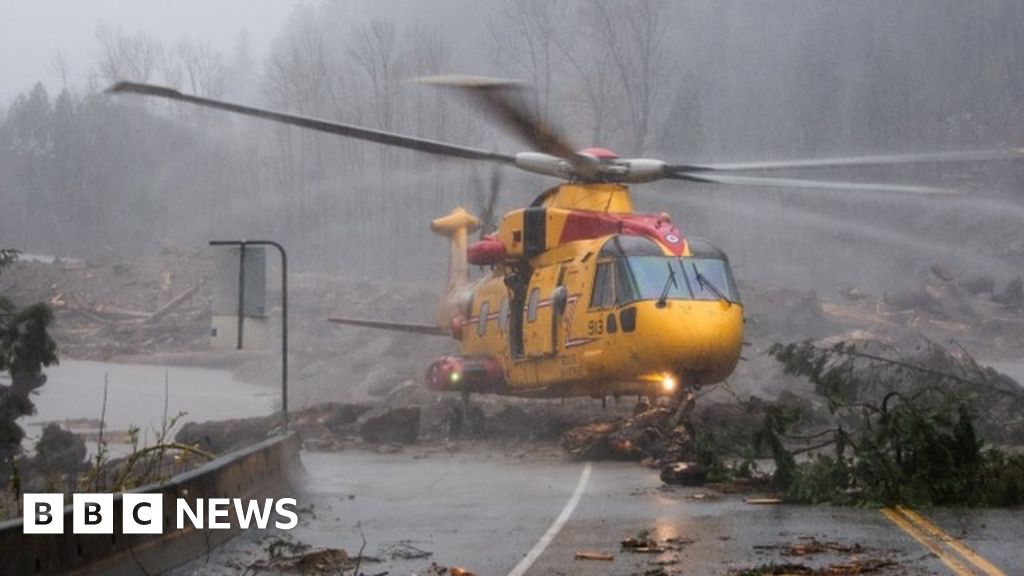
This video can not be played
To play this video you need to enable JavaScript in your browser.
A state of emergency has been declared in the Canadian western province of British Columbia after a major storm cut road and rail links in the region.
The Canadian Armed Forces have been deployed to help thousands of stranded residents who have been trapped since the storm hit overnight on Sunday.
Prime Minister Justin Trudeau pledged assistance during a visit to Washington DC and said troops would help rebuild.
One woman was killed in a landslide, and two people are missing.
Officials expect more fatalities to be confirmed in the coming days.
What is the latest on the ground?
Thousands of farm animals have died and many more remain trapped by the flood waters after the storm passed through one of Canada's most agriculturally intensive areas.
Some 20,000 people are yet to return to their homes after an "atmospheric river" - a long strip of moisture in the air that transports water from tropical areas towards the poles - dumped the region's monthly rainfall average in 24 hours.
British Columbia Premier John Horgan announced the two-week emergency order on Wednesday.
He said that travel restrictions will keep people off flooded roads, and ensure that essential goods will "reach the communities that need them".
Helicopters on Wednesday dropped food supplies to stranded mountain communities after slides destroyed roads and floods submerged major highways.
The town of Tulameen has about 400 people trapped there, according to Reuters news agency.
Some communities at higher elevations have seen temperatures drop below freezing. Farmers and ranchers at lower elevations have struggled with widespread flooding and have lost much of their livestock.
Approximately 1,500 travellers became stranded in the town of Hope after roads closed, Grace Baptist Church Pastor Jeff Kuhn told BBC News in an email on Wednesday.
More rain is forecast for Thursday.
This video can not be played
To play this video you need to enable JavaScript in your browser.
Is this due to climate change?
Officials in the region have attributed the natural disaster to the effects of climate change.
Mr Horgan said British Columbia must "bring the seven billion other souls that live on this planet to understand that we need to act now" to prevent these events in future.
The impact of climate change on the frequency of storms is still unclear, but we know that increased sea surface temperatures warm the air above and make more energy available to drive hurricanes, cyclones and typhoons. As a result, they are likely to be more intense with more extreme rainfall.
The world has already warmed by about 1.2C since the industrial era began and temperatures will keep rising unless governments around the world make steep cuts to emissions.
- FEATURE: The day a heatwave destroyed a village
- WATCH: What are 'atmospheric rivers'?
University of British Columbia atmospheric scientist Rachel White told the BBC that the massive devastation caused by this storm can likely be attributed to a combination of human-caused factors.
"As we warm up the climate, heavy rainfall events such as these are going to get more intense," she said.
"As we warm up the atmosphere, as we warm up the oceans - more water is evaporated from the oceans. So then when we have these atmospheric river events, essentially the atmosphere can carry more water towards our mountains." This then condenses into rain.
The extreme weather in Canada comes days after world leaders met for the COP26 climate conference in Glasgow.
The same region, British Columbia, suffered a record high heat wave in the summer that killed more than 500 people as well as wildfires, including one that destroyed the village of Lytton.
"emergency" - Google News
November 18, 2021 at 11:08PM
https://ift.tt/3kKJyUH
Vancouver storm: A state of emergency has been declared in British Columbia - BBC News
"emergency" - Google News
https://ift.tt/2VVGGYQ
https://ift.tt/3d7MC6X
emergency
Bagikan Berita Ini














0 Response to "Vancouver storm: A state of emergency has been declared in British Columbia - BBC News"
Post a Comment